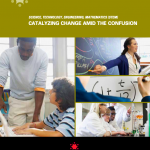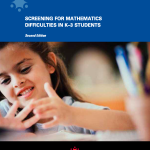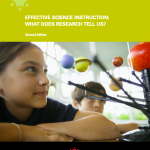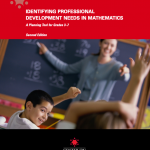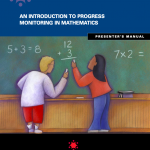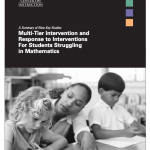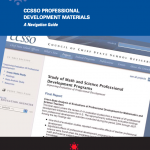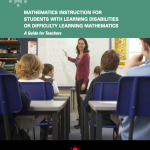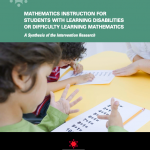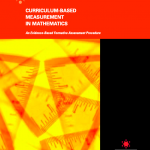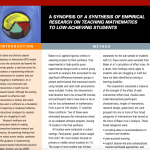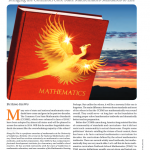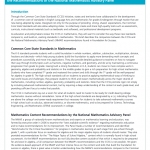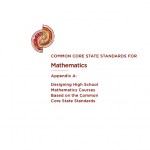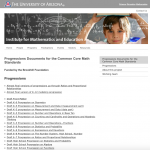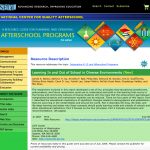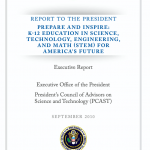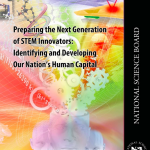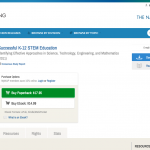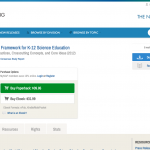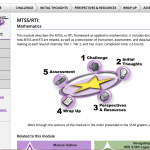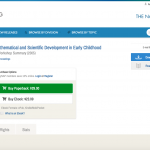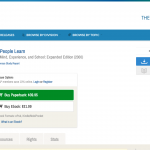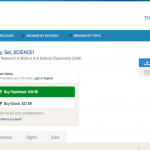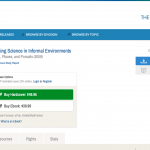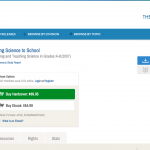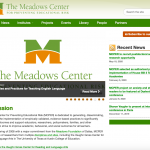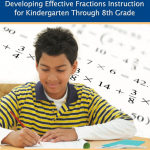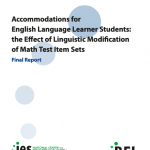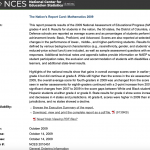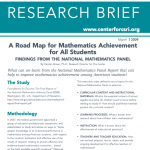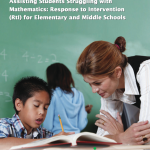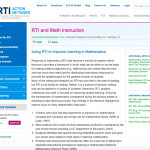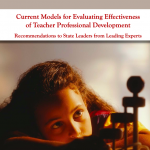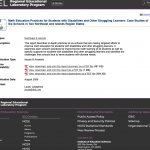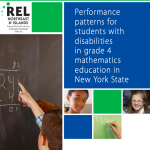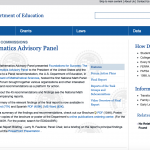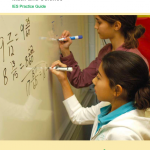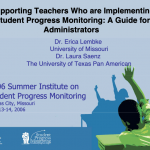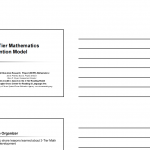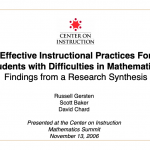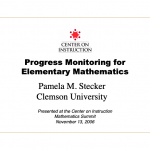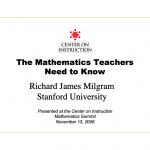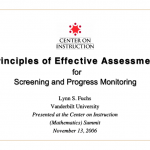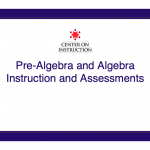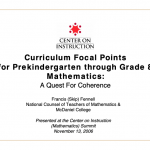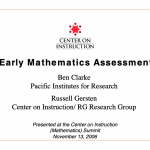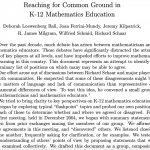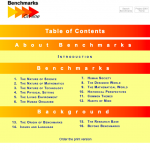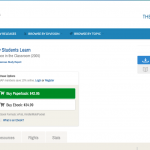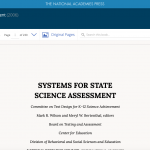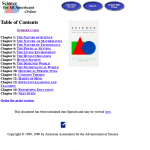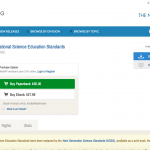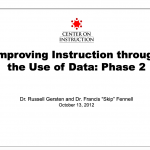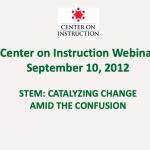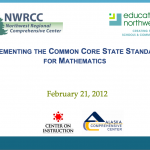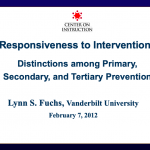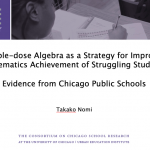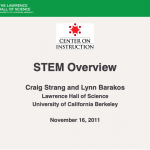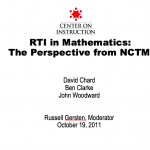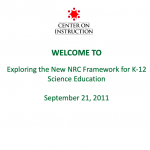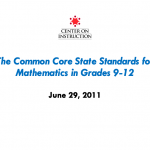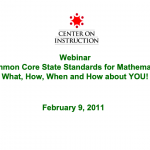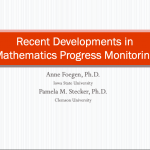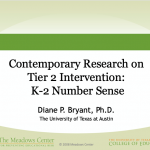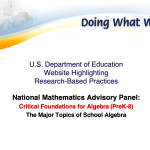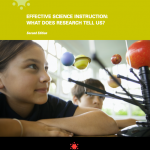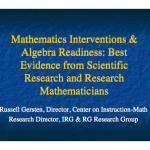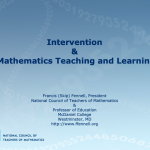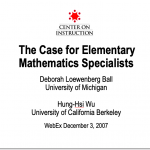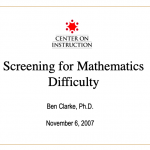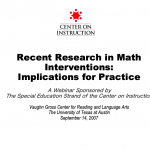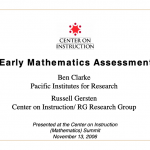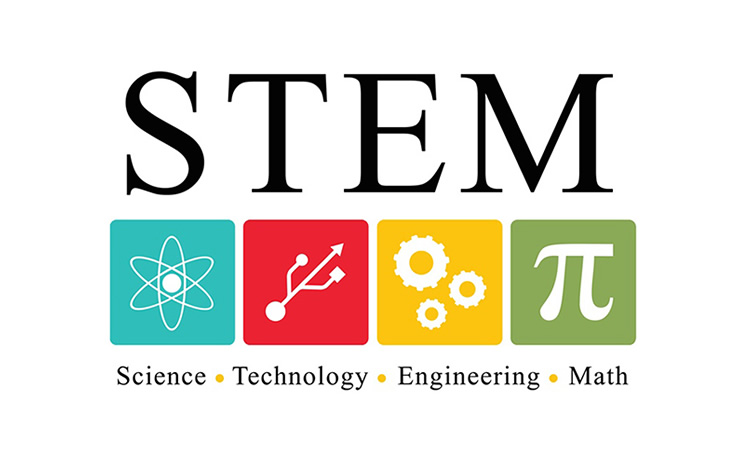
RMC Research offers materials and resources on Mathematics and Science instruction and assessment that help educators improve academic outcomes for all students in the content areas of Mathematics and Science. We also offer general information on STEM (Science, Technology, Engineering, and Mathematics) that will support the increase in the number of students pursuing STEM fields in their academic studies and careers and improve preparation for the next generation of engineers, scientists, mathematicians, and technicians.
Organization Levels
Content Areas
Grade Levels
Topic Areas
ESSA Evidence Tier
This document offers an overview of the role of STEM in current educational improvement efforts. It offers a brief history of STEM initiatives and publications and attempts to capture important trends and dispel confusion over the goals and approaches of STEM initiatives.
This second edition of Screening for Mathematics Difficulties in K-3 Students which was originally published in 2007 updates the document with new research in the assessment field in developing valid and reliable screening measures for early mathematics difficulties.
This resource identifies professional development needs specific to mathematics. It includes a series of guiding questions that help SEAs evaluate their existing programs and identify professional development activities that meet their needs.
This brief guide provides assistance in exploring the large collection of professional development materials and resources available from the Council of Chief State School Officers (CCSSO). This document supports improvements in professional development in mathematics for implementation of School Improvement Grants (SIG) requirements.
This guide for teachers is a companion piece to the meta-analysis from the Center on Instruction, Mathematics Instruction for Students with Learning Disabilities or Difficulty Learning Mathematics: A Synthesis of the Intervention Research.
This meta-analysis synthesizes experimental and quasi-experimental research on instruction that enhances the mathematics performance of students in grades 1-12 with learning disabilities.
This report describes M-CBM (Mathematics Curriculum-Based Measurement) including a brief history, basic procedures, implications for practice, and further resources. It also reviews the research that supports the use of M-CBM.
Appendix A of the Common Core State Standards (CCSS) document helps states think about how the high school CCSS might be organized into four Model Course Pathways in Mathematics that provide college and career readiness.
This resource provides a rationale for the development of schools that prepare students for life-long learning that is life-wide and life-deep, using the racial, cultural, ethnic, and linguistic capital that students bring from their homes and communities to teach the knowledge, attitudes, and skills they need to be effective citizens in the United States and the world.
The President's Council of Advisors on Science and Technology (PCAST) prepared this September 2010 report to provide a two-pronged strategy for improving K-12 STEM education: prepare and inspire the next generation of students.
Based on the National Research Council study "Learning Science in Informal Environments: People, Places, and Pursuits", this book makes valuable research accessible to those frontline science educators working in informal settings outside school in museums, libraries, nature centers, after-school programs, amateur science clubs, and even during conversations at the dinner table.
This report from the NRC published in 2011 outlines criteria for identifying successful STEM schools and programs for the purpose of informing schools, districts, state and national policy makers about decisions made to improve K-12 STEM education.
This resource is a classroom-focused companion to the National Research Council's Taking Science to School report and serves to directly connect research-based knowledge of teaching and learning science with ways of supporting teacher practice in Grades K-8.
This report examines the potential of non-school settings (walking in the park, watching a sunrise, visiting a science center, zoo, or aquarium as after-school activities or through a local organization's program) for science learning and provides the research base for applying sound educational principals to a variety of informal science education settings.
The Meadows Center for Preventing Educational Risk (MCPER) at The University of Texas at Austin is dedicated to generating and disseminating empirically validated knowledge and practices to influence educators, researchers, policymakers, families, and other stakeholders who are striving to reduce academic, behavioral, and social risk in all learners, particularly those with disabilities.
This practice guide presents five recommendations for educators to improve students' understanding of fractions through strategies to help younger children understand fraction concepts and older students understand the meaning of fractions.
This research brief from The Center for Comprehensive School Reform and Improvement at Learning Point Associates focuses on curricular content and instructional materials and learning processes and the recommendations for PK-12 education.
This guide provides eight recommendations designed to help teachers, principals, and administrators use Response to Intervention for the early detection, prevention, and support of students struggling with mathematics.
This document summarizes the proceedings of a CCSSO conference in which leaders in the fields of research and evaluation of teacher professional development discussed how to use findings from research to develop quality, effective PD for teachers.
This report describes in-depth practices at six schools that are making targeted efforts to improve math education for students with disabilities and other struggling learners.
This report describes the mathematics performance of 4th grade students with disabilities across schools categorized by need-to-resource capacity and compares their performance by school with that of general ed students across New York 2003-2005.
This PowerPoint presentation from the National Center for Student Progress Monitoring 2006 Summer Institute discusses issues related to successfully implementing CBM at the school or district level, including administrative leadership and support for staff.
This PowerPoint, presented at the November 13-14, 2006, Math Summit: Providing Evidence-Based Practices and Implications of NCTM Focal Points, provides a review of meta-analysis findings on effective instructional practices for elementary and middle school students in the delivery of mathematics instruction.
This PowerPoint, presented at the November 13-14, 2006, Math Summit: Providing Evidence-Based Practices and Implications of NCTM Focal Points, provides an overview of progress monitoring systems that can be used to track student growth in elementary mathematics.
This PowerPoint, presented at the November 13-14, 2006, Math Summit: Providing Evidence-Based Practices and Implications of NCTM Focal Points, describes the critical content that teachers need to know and convey to their students to ensure successful math outcomes.
This PowerPoint, presented at the November 13-14, 2006, Math Summit: Providing Evidence-Based Practices and Implications of NCTM Focal Points, reviews key principles for conducting screening and progress monitoring in mathematics with key examples of measures provided.
This PowerPoint, presented at the November 13-14, 2006, Math Summit: Providing Evidence-Based Practices and Implications of NCTM Focal Points, describes assessments that can be used to determine students who are struggling with pre-algebra and algebra and monitor their progress towards acquiring knowledge in these areas.
This PowerPoint, presented at the November 13-14, 2006, Math Summit: Providing Evidence-Based Practices and Implications of NCTM Focal Points, provides a review of the the new NCTM focal points and the process of constructing the focal points.
This October 3, 2012, School Turnaround Learning Community (STLC) webinar examines data from one state's end-of-year assessment data in the area of fractions to learn how these data can be used to pinpoint areas for future proactive class-wide (Tier 1) intervention, how data distractors can be used to inform Tier 2 interventions for students who struggle to keep up with the class in mathematics, how one state is assisting elementary math specialists in transitioning to and implementation of the Common Core with a focus on research-based practices and policy-driven practices, and what resources improve mathematics teaching and learning.
The Center on Instruction hosted a webinar September 10, 2012, focused on its recently released document, "Science, Technology, Engineering, Mathematics (STEM): Catalyzing Change Amid the Confusion", which offers an overview of the role of STEM in current educational improvement efforts.
Russell Gersten and Brad Findell of the Center on Instruction presented "Implementing the Common Core State Standards for Mathematics" at a February 21, 2012, webinar co-sponsored with the Northwest Regional Comprehensive Center and the Alaska Comprehensive Center.
The Center on Instruction hosted a webinar on February 7, 2012, on Responsiveness-To-Intervention in Mathematics: Distinctions among Primary, Secondary, and Tertiary Prevention, featuring Dr. Lynn Fuchs, who discussed a framework for conceptualizing RTI and outlined meaningful distinctions among primary, secondary, and tertiary prevention in mathematics.
The Center on Instruction hosted a webinar on January 10, 2012, on RTI in Mathematics at the Secondary Level, featuring Dr. Takako Nomi from the University of Chicago Consortium on School Research and Dr. John Woodward of the School of Education at the University of Puget Sound.
The Center on Instruction held a webinar September 21, 2011, entitled “Exploring the New National Research Council's Framework for K-12 Science Education, presented by COI-Science Director Craig Strang, along with Vanessa Lujan, and Lynn Barakos of the Lawrence Hall of Science at the University of California at Berkeley.
The Center on Instruction hosted a webinar on June 29, 2011, featuring Fred Dillon, who provided on overview of the Common Core State Standards in Mathematics in Grades 9-12, with a focus on the mathematical practices and five "strands".
The Center on Instruction hosted a webinar on February 9, 2011, featuring Dr. Francis (Skip) Fennell who provided an overview of the Common Core State Standards and the intended impact on the field of mathematics.
This conference, held December 10-11, 2008 in Long Beach, California, focused on the National Math Panel Final Report and ways RCCs can help states respond to its recommendations in the key areas of teacher content knowledge and RTI/algebra reading interventions.
The Center on Instruction held a WebEx on December 3, 2007, for RCC staff. Math experts Dr. Deborah Loewenberg Ball and Dr. Hung-Hsi Wu discussed the issue of the use of mathematics specialists in elementary school mathematics program.
The Center on Instruction hosted a WebEx on November 6, 2007, for Regional Comprehensive Center staff, to discuss two recently released math resources.
The Center on Instruction held a WebEx on September 14, 2007, for Regional Comprehensive Center staff to highlight the recently released synopsis of the 2002 publication A Synthesis of Empirical Research on Teaching Mathematics to Low-Achieving Students.
The Center on Instruction, in conjunction with the New York Regional Comprehensive Center, hosted a Math Institute November 13-14, 2006, to introduce recently developed materials and to discuss how these PowerPoint presentations and tools can be used in work with states.

